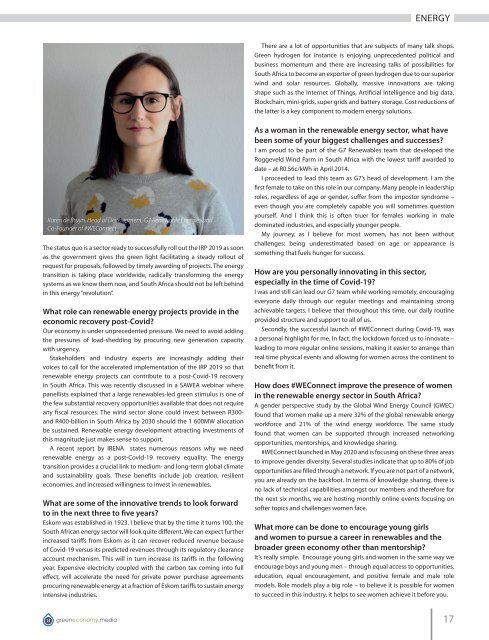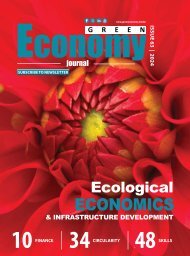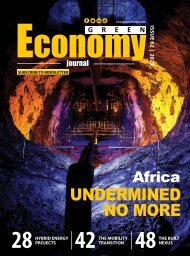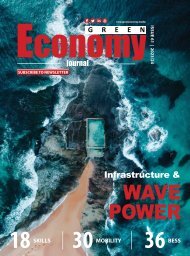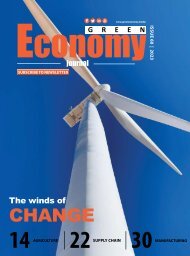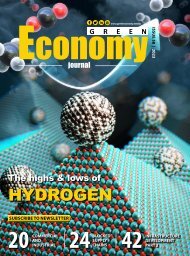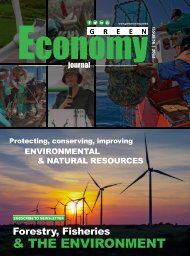Green Economy Journal Issue 41
You also want an ePaper? Increase the reach of your titles
YUMPU automatically turns print PDFs into web optimized ePapers that Google loves.
ENERGY<br />
There are a lot of opportunities that are subjects of many talk shops.<br />
<strong>Green</strong> hydrogen for instance is enjoying unprecedented political and<br />
business momentum and there are increasing talks of possibilities for<br />
South Africa to become an exporter of green hydrogen due to our superior<br />
wind and solar resources. Globally, massive innovations are taking<br />
shape such as the Internet of Things, Artificial Intelligence and big data,<br />
Blockchain, mini-grids, super grids and battery storage. Cost reductions of<br />
the latter is a key component to modern energy solutions.<br />
Karen de Bruyn, Head of Development, G7 Renewable Energies and<br />
Co-Founder of #WEConnect<br />
The status quo is a sector ready to successfully roll out the IRP 2019 as soon<br />
as the government gives the green light facilitating a steady rollout of<br />
request for proposals, followed by timely awarding of projects. The energy<br />
transition is taking place worldwide, radically transforming the energy<br />
systems as we know them now, and South Africa should not be left behind<br />
in this energy “revolution”.<br />
What role can renewable energy projects provide in the<br />
economic recovery post-Covid?<br />
Our economy is under unprecedented pressure. We need to avoid adding<br />
the pressures of load-shedding by procuring new generation capacity<br />
with urgency.<br />
Stakeholders and industry experts are increasingly adding their<br />
voices to call for the accelerated implementation of the IRP 2019 so that<br />
renewable energy projects can contribute to a post-Covid-19 recovery<br />
in South Africa. This was recently discussed in a SAWEA webinar where<br />
panellists explained that a large renewables-led green stimulus is one of<br />
the few substantial recovery opportunities available that does not require<br />
any fiscal resources. The wind sector alone could invest between R300-<br />
and R400-billion in South Africa by 2030 should the 1 600MW allocation<br />
be sustained. Renewable energy development attracting investments of<br />
this magnitude just makes sense to support.<br />
A recent report by IRENA states numerous reasons why we need<br />
renewable energy as a post-Covid-19 recovery equality: The energy<br />
transition provides a crucial link to medium- and long-term global climate<br />
and sustainability goals. These benefits include job creation, resilient<br />
economies, and increased willingness to invest in renewables.<br />
What are some of the innovative trends to look forward<br />
to in the next three to five years?<br />
Eskom was established in 1923. I believe that by the time it turns 100, the<br />
South African energy sector will look quite different. We can expect further<br />
increased tariffs from Eskom as it can recover reduced revenue because<br />
of Covid-19 versus its predicted revenues through its regulatory clearance<br />
account mechanism. This will in turn increase its tariffs in the following<br />
year. Expensive electricity coupled with the carbon tax coming into full<br />
effect, will accelerate the need for private power purchase agreements<br />
procuring renewable energy at a fraction of Eskom tariffs to sustain energy<br />
intensive industries.<br />
As a woman in the renewable energy sector, what have<br />
been some of your biggest challenges and successes?<br />
I am proud to be part of the G7 Renewables team that developed the<br />
Roggeveld Wind Farm in South Africa with the lowest tariff awarded to<br />
date – at R0.56c/kWh in April 2014.<br />
I proceeded to lead this team as G7’s head of development. I am the<br />
first female to take on this role in our company. Many people in leadership<br />
roles, regardless of age or gender, suffer from the impostor syndrome –<br />
even though you are completely capable you will sometimes question<br />
yourself. And I think this is often truer for females working in male<br />
dominated industries, and especially younger people.<br />
My journey, as I believe for most women, has not been without<br />
challenges: being underestimated based on age or appearance is<br />
something that fuels hunger for success.<br />
How are you personally innovating in this sector,<br />
especially in the time of Covid-19?<br />
I was and still can lead our G7 team while working remotely, encouraging<br />
everyone daily through our regular meetings and maintaining strong<br />
achievable targets. I believe that throughout this time, our daily routine<br />
provided structure and support to all of us.<br />
Secondly, the successful launch of #WEConnect during Covid-19, was<br />
a personal highlight for me. In fact, the lockdown forced us to innovate –<br />
leading to more regular online sessions, making it easier to arrange than<br />
real time physical events and allowing for women across the continent to<br />
benefit from it.<br />
How does #WEConnect improve the presence of women<br />
in the renewable energy sector in South Africa?<br />
A gender perspective study by the Global Wind Energy Council (GWEC)<br />
found that women make up a mere 32% of the global renewable energy<br />
workforce and 21% of the wind energy workforce. The same study<br />
found that women can be supported through increased networking<br />
opportunities, mentorships, and knowledge sharing.<br />
#WEConnect launched in May 2020 and is focusing on these three areas<br />
to improve gender diversity. Several studies indicate that up to 80% of job<br />
opportunities are filled through a network. If you are not part of a network,<br />
you are already on the backfoot. In terms of knowledge sharing, there is<br />
no lack of technical capabilities amongst our members and therefore for<br />
the next six months, we are hosting monthly online events focusing on<br />
softer topics and challenges women face.<br />
What more can be done to encourage young girls<br />
and women to pursue a career in renewables and the<br />
broader green economy other than mentorship?<br />
It’s really simple. Encourage young girls and women in the same way we<br />
encourage boys and young men – through equal access to opportunities,<br />
education, equal encouragement, and positive female and male role<br />
models. Role models play a big role – to believe it is possible for women<br />
to succeed in this industry, it helps to see women achieve it before you.<br />
greeneconomy.media<br />
17


